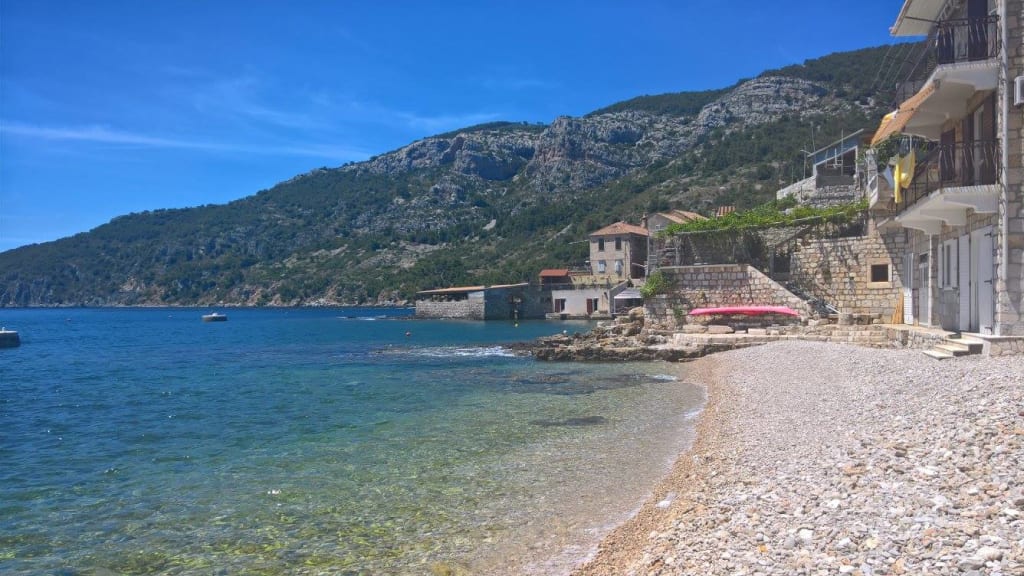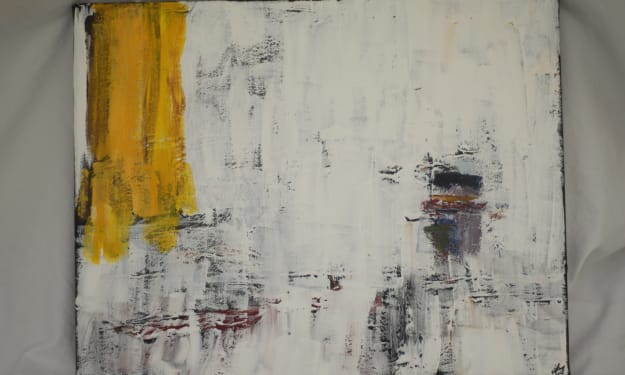Old Soft Bristles
Even if I can’t pick up a brush, I am still an artist.

The first few days were weird. I hadn’t realized how introverted I had become, how much time I had spent at the nursing home with grandma. I stayed in bed until eleven. There was no need to get a job, not for a long time. I did nothing but sit in the sun. Around two, I went to a coffee shop up the street from my apartment, had a rose and cardamom latte and a bowl of granola totaling $23.45. I figured I could spend that kind of money on granola now. It was nothing to the new bank account, but never having more than three thousand to my name after years of working, it still felt like a sin. I drew a swirl of lines and scratches along the page of my sketchbook. I drew the static-like dots I see when I look up at the sky. I drew these things, because I didn’t know what else to do. In elementary school, I would make frequent visits to the underpaid counselor and would annoy her with things like, “I just don’t know what to draw.” My tubes of paint sat in their drawers. My brushes in their cups. I didn’t want to do anything except sit there. It wasn’t until day four, that I decided to open my grandma’s little black book.
The outside covering, some black moleskin, was torn and withered from use. In it I found a language I didn’t understand full of check marks over the letters. Grandma had taught me basic German, and some spelling and phrases seemed similar, but it was as if this had been mixed with the flow and vocabulary of something else. I felt that force one gets when they sit down to write a massive paper, or really get into the flow of their creation. It didn’t take much researching after I typed in the word “Zagreb,” The capitol city of Croatia. I opened translator, set it for Croatian to English, and entered a few of her phrases. They matched. She’d never spoken about this at all. She was born during the second world war, and lived with her extended family packed into a tiny little apartment until she was fourteen, when her mother fled to the States. She had highlighted and aggressively underlined an address and a name:
Tetka Hedviga Zorić. “Tetka” means aunt. I had someone. At least one. One was enough.
I watched a few introductory videos. I knew I wasn’t going to retain all of it, but I knew it would be better to know some, even if it was just yes-no, thank you, that kind of thing. I stumbled over the pronunciations. So many Zs and the throat noises, putting Js in the middle of words. I wasn’t used to it. My skin felt like that static I see in the sky.
I’d been so used to the industrial and colonial structures in the States that the tiled roofs and Vienna-like buildings of Zagreb took me by surprise. Trolleys ran through the mountains which the city was built on. This place was alive, somehow ancient and new. The air smelled fresher even. At a table in the middle of the main road, I waited. I only got any service because two beautiful women came and sat down at the table next to me. The server came out immediately, took their orders with such sweetness in his voice, then turned to me, dropped a few octaves and said, “What you want.” I ordered burek – beef wrapped in puff pastry and rolled into a coil - in as best Croatian as I could. He huffed and bolted back into the kitchen.
After lunch, I came to a run-down building covered in graffiti and layers of dirt. I opened my grandma’s journal. It was the same address. I found apartment seven on the fourth floor, passing a few loose chickens on the stairs. The elevator shaft was empty and mold lingered in the corners. I rang the bell and it fell off the wall. A vein of terror ran through me. Had I really just done this? Bought a plane ticket to Croatia and went within one day? My grandma hadn’t been here since the fifties. What had I expected? When I turned, there was an old lady staring at me from the cracked door of apartment eight.
“Dobar dan,” I said. She stared at me.
“No English.”
“Ah,” I panicked, and asked if she spoke German.
“Yes,” she replied in German. There was something in her voice. Resentment, disgust, or shame, I couldn’t tell.
“Hedviga Zorić? She was my grandma’s aunt,” I said. The woman’s face ignited with excitement and she hustled me into her little apartment.
“Your grandma was little Ana? Oh Yes, yes, come in!”
This woman must have been ancient to call my grandmother, “little Ana.” She switched back to Croatian to yell something into the next room, and a woman about my own age came in with a round bottle of clear alcohol. She had on no make-up, her green eyes popped, and her short blond hair was pulled back. They poured out three shots. The old lady downed it in one go and smacked her lips like this was a daily occurrence. She asked the younger woman something, who then looked at me and spoke in English.
“My grandma says you are a relative of Mrs. Zorić. So, you are welcome here.”
“Thank you. She’s my grandma’s aunt.”
“She’s dead,” the young woman said. It struck me like a brick wall. I stumbled over my words.
“I have this little journal of my grandma’s. I was hoping to find… Well, I don’t know.”
The old woman said something in Croatian. She pointed, raised her eyebrows with intrigue then yelled at her granddaughter. The young woman yelled back to shut her up, then turned to me.
“Mrs. Zorić has a son. Antun, by Omis.”
“That would be my grandma’s cousin! Omis?”
“It’s a little town on the beach, south of Split.”
“Do you have an address?”
“Yes, but you won’t find it. I will drive you,” she said as she stood up.
“Wait, what?”
“You need a car to get there. I will drive you. We go.”
She had grabbed her denim jacket and was already out their door. I turned to the old woman who had a massive smile, thanked her in Croatian, and left.
The car ride was long, but the landscape changed quickly. It was as if the hills had been formed by years of dragons stomping around, burning all the greenery, and only just now had the grass begun to grow again through the cracks. I looked at the young woman.
“What’s your name?”
“Vesna.” She kept her eyes on the road.
“Your English is good.”
“I know.”
“Your grandma doesn’t speak it.”
“No.”
“But she speaks German.”
“Her generation survived the Nazi occupation, so they had to learn it. My parents’ generation survived the Soviet occupation, so they had to learn Russian. Now English is the language to know. Speaking Croatian is the only way we remain together.”
I looked out the window.
“You speak German,” she said.
“Grandma taught me. Never thought I’d actually use it.”
“It is good. Antun lived through it all. He prefers Russian.”
“You know him.” I nodded. “Why are you driving me again?”
“My grandma wants me to marry you.”
“Oh. Um…”
“I will not marry you.”
“Okay, cool. I’m not interested in marriage.”
“Me neither. But you can be my friend.” I looked at her. Did she really just say friend? For the first time in the drive, she looked back at me. There was something recognizable deep in her eyes that wanted to be dug out. “I needed to leave.”
I understood and simply nodded. It was exactly why I had come to Croatia. That’s when the landscape changed again. We came out of the mountains and the ocean was visible. It was unlike any of the polluted or brackish water I had seen in the States. This was clear, with only the hint of blue on the waves. When you find a place with truly, pure sapphire water, you understand the cliché. This place had everything. I was hoping it had what I wanted. Whatever that was.
On our right, the waters. On our left, sheer cliffs with buildings nuzzled in. Some of these were more the communist style, concrete squares, none of which were upkept. We drove a little further before Vesna turned into a small dirt road going up the mountainside. We stopped at an old estate and got out. A pen of black pigs was right next to the car with a single donkey. Vesna walked towards a building below us as I looked out at the water. I smelled something cooking and glanced down. Through a hole in the roof, I saw a bald headed, fat Croatian man in his underwear, squatting over a pig on a spit-roast. His attention swiveled up and our eyes locked. He grunted and we both ran off.
I caught up with Vesna and considered how to explain, but she had already knocked on the door. The bald man answered, wearing a suit without a tie. Sweat covered his chest and head. He welcomed us out to his patio, sat us down and served us food as if this house was some kind of restaurant.
“Are you Antun?” I asked after finishing what must have been one of his pigs from the pen. He didn’t speak English, so Vesna repeated me in Croatian. He said he wasn’t, but Antun was his friend. Once I convinced this underwear sporting gatekeeper who I was, he said we could go meet him.
Antun was in a tiny bed, in a tiny room, with newspapers stacked around him. He had suffered a stroke and had been bedridden for twenty-five years. For my entire life, he had been in this room unable to move. He was my only living relative. Physically he looked nothing like me, but he felt like me.
“I’m surprised you’re here,” he said in English. “Bless Ana. She kept sending me money to survive on, despite hating me.”
“She hated you?”
“He’s a communist,” Vesna said.
“Well, they gave me healthcare. Now...” He looked sad. He had lost a part of his soul somewhere in his travels. I saw behind his eyes, the changes that he had undergone through his entire life. Antun was an overly-reflective man. His voice turned jovial, then bitter, “But without the USSR, I can open this stupid place, or I could if not for the stroke.”
“What is it?” I found myself asking.
“An artist’s colony. My dream. I wanted a place where people would come and create together. The next hub for people to bring on a wave. Who needs Paris?” He sighed. “No artist accepts reality, but we’re all obsessed with it. Even if I can’t pick up a brush, I am still an artist.”
Excitement boiled in my stomach, yet all I could say was, “You paint?”
“I used to…” He shrugged.
I went into the kitchen. A toilet sat in the corner next to the fridge. Unfinished paintings leaned against the counters. My grandmother had left her little journal with these names and the Zagreb address for me. She knew what Antun had been trying to do, but she couldn’t bring herself to see him. Why hadn’t she said anything? Without her, I had no one and nothing back in the states. My heart raced again. How long had it been? Would anyone come? One hundred thousand dollars could go a long way for this place. I picked up one of Antun’s brushes, untouched in my lifetime. The bristles were still soft. I felt the opposite of static.
“Do you paint?” Antun asked. He had no idea.
“Yes,” I said, and put brush to canvas.
About the Creator
Nick Blocha
I am a writer, actor, painter, and director who uses all forms to look at this world. As creators, in whatever form it may be, we are truly capturing and releasing life, sharing it with one another. There is nothing more special than that.






Comments
There are no comments for this story
Be the first to respond and start the conversation.